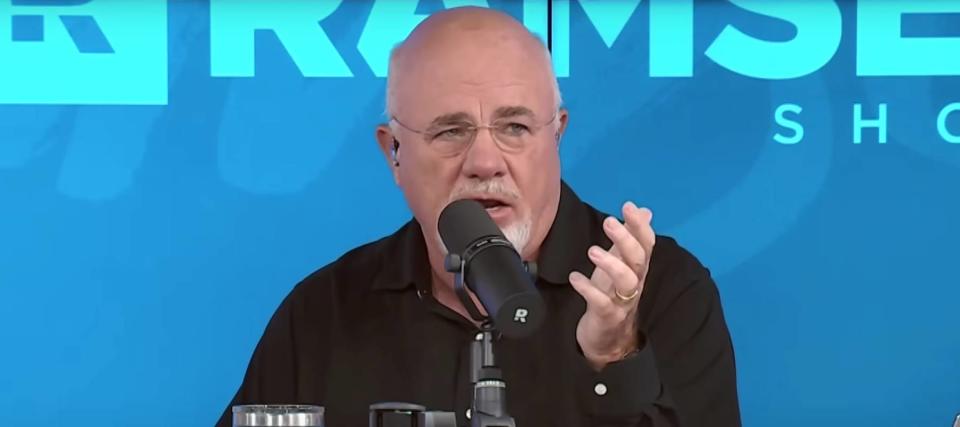‘I was so stupid': Dave Ramsey revealed how he lost everything by flipping houses back in the 1980s — here are 3 top tips to invest in real estate 'the right way'
As a young man, Dave Ramsey made a fortune flipping houses. But one flop cost him everything.
“I did my first flip in 1983,” the financial advice guru said on a recent episode of his radio show. “I was so stupid. I thought that everything that was a foreclosure was a good buy.”
Don't miss
Commercial real estate has outperformed the S&P 500 over 25 years. Here's how to diversify your portfolio without the headache of being a landlord
Jeff Bezos and Oprah Winfrey invest in this asset to keep their wealth safe — you may want to do the same in 2023
'This janitor in Vermont built an $8M fortune without anyone around him knowing. Here are the 2 simple techniques that made Ronald Read rich — and can do the same for you
Ramsey went on to describe how the house he purchased needed far more labor, capital and time than he’d anticipated. He also shared how he miscalculated the value of his own labor as he repaired the property. When it sold four years later, Ramsey had lost more than $14,000 on the unit, which he initially purchased for just $7,000.

Unfortunately, his experience isn’t all that unusual. Investors bought, repaired and sold more than 407,000 single-family homes and condos in 2021, pocketing just $67,900 on average — the lowest level gross profit margins on home flips since 2008, according to property data firm ATTOM. Meanwhile, Zillow’s chief economist expects profits to be squeezed further in 2023 as mortgage rates and home renovation costs accelerate.
Simply put, house flipping isn’t as easy or lucrative as it once was. In fact, the probability of losing money like Dave Ramsey did is relatively high. Instead, property investors could focus on more long-term approaches, like the ones described below.
Buy and hold
On his blog, Ramsey recommends a long-term, buy-and-hold approach to real estate. This means purchasing a property at a fair price and waiting for it to gradually appreciate in value over time. It parallels how billionaire Warren Buffett invests in stock.
Historical evidence backs up this strategy. On average, U.S. real estate has appreciated at an annual rate of 4.4% since 1991. Some years have proven more volatile than others, with double-digit gains or losses. But over time, this volatility tends to even out. That’s why a buy-and-hold approach to real estate is often recommended.
This strategy is also easier than flipping. Investors simply need to value the property appropriately and make sure they pay a fair price — in part by reviewing comparable sales prices in a neighborhood and taking into account how much it may cost to repair and renovate it.
After that, all they need to do is maintain the property, pay taxes and insurance, and pay down the mortgage.
Read more: Here are 7 amazing 1-week vacations you can do for around $1,000
Buy and rent
Real estate investors can also rent a property out to tenants. This creates cash flow and enhances property value.
Being a landlord is lucrative in some parts of the country. The capitalization rate (that is, net operating income (NOI) divided by property value) can run as high as 10.18% in Greenwood, Miss,i, according to Mashvisor. That city ranks tops on its 2021 list of traditional cap rates by city in 2021.
Apartments in Ohio and Michigan can deliver comparable rates that range from 9% to 9.5%, according to Dataspot Analytics LLC.
Rental income is an excellent way to enhance the total return from your property investment. It’s also a long-term strategy because you can expect to receive it for the duration of your holding. But bear in mind it’s not exactly passive. To some extent, you’ll have to get involved in tenant affairs when something breaks or there’s a legal dispute involving rent.
That being said, with the help of some new investing platforms, it’s possible to become a landlord without all the tenant headaches. Through crowdfunding, you’re able to invest in institutional-quality commercial real estate investments that had previously been reserved for the ultra wealthy.
Some platforms even allow you to invest with as little as $100.
Reduce leverage
Ramsey recommends minimizing debt. In fact he believes, “paying off your home is the best way to invest in real estate.” This strategy makes more sense when interest rates climb, as we’re witnessing now. The average rate on a 30-year fixed mortgage is 6.81%. There’s no way to predict whether this rate will accelerate further or stay stagnant for several years, so investors can’t plan to refinance anytime soon.
Simply put, any new loan — whether for a new property or refinancing an existing one — could cost you thousands more in interest over the life of your loan. And that’s especially true if you were fortunate enough to lock down a mortgage rate back in the early days of COVID-19 when rates hit record lows.
For now, real estate investors would be wise to minimize their debt and set their eyes on more affordable homes.
What to read next
Worried about the economy? Here are the best shock-proof assets for your portfolio. (They’re all outside of the stock market.)
Owning real estate for passive income is one of the biggest myths in investing — but here is 1 simple way to really make it work
Earn extra cash for your weekend with these quick money hacks
This article provides information only and should not be construed as advice. It is provided without warranty of any kind.
